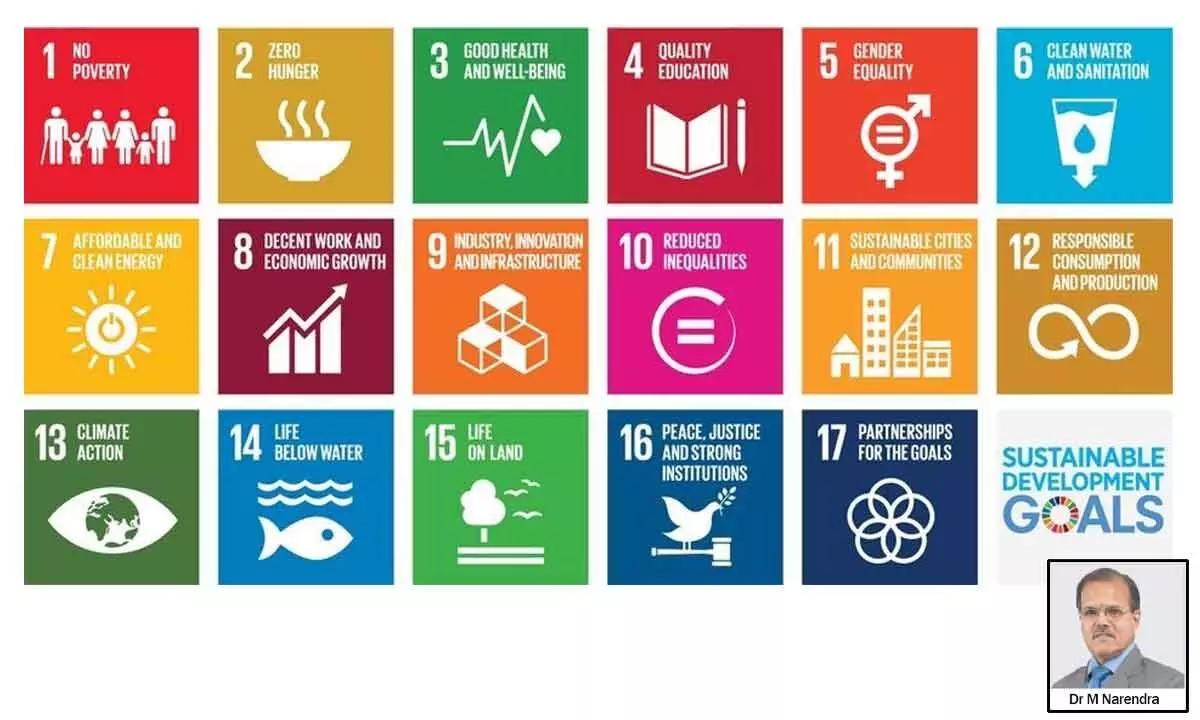Collective approach needed to achieve SDGs by 2030
The Russia-Ukraine war and Israel-Hamas conflict have led to supply chain disruptions and uncertainty
image for illustrative purpose

Climate change mitigation and adaptation plans need large investments, which, without the help of developed countries, cannot be undertaken. The loss and damage fund at COP 28 achieved less than the desired levels. Funds were mobilized in millions when the requirement is in trillions of dollars
The slowing of the global economy in the current year and the next is bound to impact the commitment to achieve Sustainable Development Goals (SDG) by 2030.
The geo political conflict, multiple shocks arising from climate change, heavy debt of low-income countries, monetary tightening leading to high interest rates to fight inflation and food shortages leading to food security issues, widening the gap between rich and poor between countries and amongst people will wreak havoc in people’s lives, especially their livelihoods further jeopardising progress towards sustainable development.
Hence there needs to be a larger commitment from the political and economic leadership and actions to accelerate achievements of SDGs.
The achievement at the global level leaving no country or person behind requires enhanced attention and greater efforts rather than mere incremental and fragmented change, which will be insufficient to achieve SDGs.
Covid-19 and the sufferings of human lives because of the pandemic and economic loss have affected most of the countries, which, in turn, adversely impacted the drive towards SDGs. This was followed by prolonged inflation as monetary easing led to inflation thereby underscoring the need to moderate and control inflation, monetary tightening and interest rate increase that are still continuing as central banks are yet to get full confidence that they have achieved their desired inflation level.
This situation worsened because of the Russia-Ukraine war and the Israel-Hamas conflict. These have led to supply chain disruptions and uncertainty. In the meantime, 2023 being the hottest in 1, 20,000 years, the climate change and disasters added to human suffering.
Poor countries had to borrow heavily to meet the fund requirements towards fighting Covid-19 leaving them with heavy debt burdens. Only a debt restructuring can bail such economies out of the financial mess. Such countries with heavy debt will have less fiscal buffers, plying that their developmental expenditure to meet the SDGs will suffer. Moreover, climate change mitigation and adaptation plans need large investments, which, without the help of developed countries, cannot be undertaken. The loss and damage fund at COP 28 achieved less than the desired levels. Funds were mobilized in millions when the requirement is in trillions of dollars.
Given these developments, it is imperative that to strengthen of multilateral development finance institutions, the active involvement of developed countries by way of enhanced capital contribution. Private investment is also required to ensure greater support to less developed and low developed countries to not only lessen their debt levels but also take up alternative energy projects than depend too much on fossil fuels.
There is a need for inclusivity, equity and diversity towards economic growth and making the benefits of economic growth available to all the needy and greater labour participation, particularly women participation, higher employment opportunities, bringing the last mile connectivity and per capita income improvement of the lower strata besides working arduously to ensure food and shelter security and better living at all levels.
Achieving the 17 SDGs can lead to prosperity. Reducing inequality within and among countries and social sectors like quality education, health facilities, better quality of affordable houses, clean water and sanitation, greater focus on preservation of forests, sustainable use of oceans, seas and marine resources , reverse land degradation and halting biodiversity loss are absolute necessities. No nation can afford to lose sight of these objectives and collectively all nations must catch up with these SDGs to protect current and future generations. Each citizen should evaluate and assess his/her contribution towards these objectives as without their involvement and participation no nation can achieve much.
In the World Economic Situation and Prospects 2024, Antonio Guterres, UN Secretary-General has stated that “By unlocking big bold investments we can drive sustainable development and climate action and put the global economy on stronger growth path for all. We must build on the progress made in the past year towards an SDG stimulus of at least $500 billion per year in affordable long-term financing for investments in sustainable development and climate action.”
These statements stress the need for action and efforts by every nation while cautioning that further delay or neglect will inflict more harm and suffering.
The report highlights that climate finance is crucial for achieving SDG and urges countries to combat climate change and its impacts. The estimated requirement of investment for energy transition technologies and infrastructure by 2050 is $150 trillion with $5.3 trillion required annually to transfer the global energy sector alone.
This gives an indication of the enormous investment needed to keep up the commitment to limit the temperature rise to 1.5° C above pre industrial levels as set out in the Paris Agreement in 2015.
With half-hearted efforts and limited help coming, the SDG13 objectives cannot be achieved.
Every effort needs to be taken by global leaders to bring a halt to wars and conflicts, promote more cooperation and multilateralism, globalisation rather than fragmentation and enhance financial help to low and less developed countries. Only then can one expect to combat climate change and collectively reach the Sustainable Development Goals by 2030
(The author is former Chairman & Managing Director of Indian Overseas Bank)

